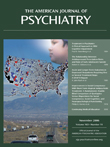To the Editor: In their thought-provoking vignette-based study
(1), Mark J. Miresco, M.D. and Laurence J. Kirmayer, M.D., F.R.C.P.C. report that psychologists and psychiatrists are more likely to hold individuals responsible for harmful behavior caused in part by a personality disorder than for behavior that stems in part from an antidepressant-induced manic episode. Yet because personality disorders have genetic (i.e., biological) underpinnings, the authors conclude that clinicians utilize a discredited “mind-brain dualism” and maintain an “entrenched,” misguided “dichotomy between intentional and unintentional events” (p. 914).
A false mind-brain dichotomy is not the only possible explanation of the study’s findings, however. The study did not control adequately for rationality and biological causation differences. Both mania and personality disorders may have biological underpinnings, but mania usually compromises a person’s capacity for rationality considerably more than a personality disorder. It is therefore no surprise that mania was negatively correlated with responsibility. It is also not surprising that responsibility was negatively correlated with biological causation: the mania vignettes described a clearly biological cause for the clinical condition, but the source of the personality disorder was left unspecified. Thus, biological causation was made vastly more salient in the mania condition, which was already weighted toward nonresponsibility.
The authors’ discussion claims that clinicians feel that people have less control over having a biologically-caused clinical condition than a psychologically-caused condition. The study results do not support this conclusion, however. The study tested perceptions of responsibility for intentional, harmful actions (causing bankruptcy, reckless sexual conduct, stabbing). Whatever one believes about persons’ control over their actions, this is not the same as one’s beliefs about control over clinical conditions.
It is the “fundamental psycholegal error”
(2) to suppose that biology or any other type of causation precludes blameworthiness for harmful actions if the behavior reflects choices that might be influenced by reason, including better recognition of and attention to long-term consequences. The mind-brain problem is ferociously complex. But when we ascribe responsibility for behavior, the key factor—both in morality and law—is not causation, but whether the behavior reflects a rational process that might be influenced by foreseeable outcomes and consequences.
Modern societies do not punish people for having psychiatric disorders because disorders are not intentional actions that can be influenced by reason. We may hold individuals responsible for intentional actions produced in part by disorder if the individuals retain sufficient capacity for rationality to be influenced by the prospect of foreseeable harms and potential criminal sanctions. We suspect that the clinicians studied by Drs. Miresco and Kirmayer may have intuitively utilized similar ways of judging responsibility and self-control, irrespective of their views about the mind-brain problem.

